The Watson Glaser Critical Thinking Appraisal
Updated May 10, 2024
- What Is the Watson Glaser Test?
- Who Uses the Watson Glaser Test and Why?
- Why Is It So Important to Be a Critical Thinker?
- What Is the Watson Glaser RED Model?
- Watson Glaser Practice Test Questions & Answers
empty
empty
empty
empty
empty
- How to Pass a Watson Glaser Test in 2025
- How to Prepare for a Watson Glaser Critical Appraisal in 2025
- Nine Top Tips for Ensuring Success in Your Watson Glaser Test
empty
empty
empty
empty
empty
empty
empty
empty
empty
- Frequently Asked Questions
- Conclusion
Modern employers have changed the way that they recruit new candidates. They are no longer looking for people who have the technical skills on paper that match the job description.
Instead, they are looking for candidates who can demonstrably prove that they have a wider range of transferrable skills.
One of those key skills is the ability to think critically.
Firms (particularly those in sectors such as law, finance, HR and marketing) need to know that their employees can look beyond the surface of the information presented to them.
They want confidence that their staff members can understand, analyze and evaluate situations or work-related tasks. There is more on the importance of critical thinking later in this article.
This is where the Watson Glaser Critical Thinking test comes into play.
What Is the Watson Glaser Test?
The Watson Glaser critical thinking test is a unique assessment that provides a detailed analysis of a participant’s ability to think critically.
The test lasts 30 minutes and applicants can expect to be tested on around 40 questions in five distinct areas:
- Inference
- Assumptions
- Deduction
- Interpretation
- Evaluation
The questions are multiple-choice and may be phrased as true/false statements in a bid to see how well the participant has understood and interpreted the information provided.
Who Uses the Watson Glaser Test and Why?
Employers around the world use it during recruitment campaigns to help hiring managers effectively filter their prospective candidates.
The Watson Glaser test has been used for more than 85 years; employers trust the insights that the test can provide.
In today’s competitive jobs market where every candidate has brought the best of themselves, it can be increasingly difficult for employers to decide between applicants.
On paper, two candidates may appear identical, with a similar level of education, work experience, and even interests and skills.
But that does not necessarily mean both or either of them is right for the job.
There is much information available on creating an effective cover letter and resume, not to mention advice on making a good impression during an interview.
As a result, employers are increasingly turning to psychometric testing to look beyond the information that they have.
They want to find the right fit: someone who has the skills that they need now and in the future. And with recruitment costs rising each year, making the wrong hiring decision can be catastrophic.
This is where the Watson Glaser test can help.
It can provide hiring managers with the additional support and guidance they need to help them make an informed decision.
The Watson Glaser test is popular among firms working in professional services (such as law, banking and insurance). It is used for recruitment for junior and senior positions and some of the world’s most recognized establishments are known for their use of the test.
The Bank of England, Deloitte, Hiscox, Linklaters and Hogan Lovells are just a few employers who enhance their recruitment processes through Watson Glaser testing.
Why Is It So Important to Be a Critical Thinker?
Critical thinking is all about logic and rational thought. Finding out someone’s critical thinking skill level is about knowing whether they can assess whether they are being told the truth and how they can use inferences and assumptions to aid their decision-making.
If you are working in a high-pressure environment, having an instinctive ability to look beyond the information provided to the underlying patterns of cause-and-effect can be crucial to do your job well.
Although it is often thought of concerning law firms and finance teams, it is easy to see how critical thinking skills could be applied to a wide range of professions.
For example, HR professionals dealing with internal disputes may need to think critically. Or social workers and other health professionals may need to use critical thinking to assess whether someone is vulnerable and in need of help and support when that person does not or cannot say openly.
Practice Watson Glaser Test with TestHQ
Critical thinking is about questioning what you already know. It is about understanding how to find the facts and the truth about a situation or argument without being influenced by other people’s opinions.
It is also about looking at the bigger picture and seeing how decisions made now may have short-term benefits but long-term consequences.
For those working in senior managerial roles, this ability to think objectively can make a big difference to business success.
What Is the Watson Glaser RED Model?
As part of the critical thinking assessment, the Watson Glaser Test focuses on the acronym, 'RED':
- Recognize assumptions
- Evaluate arguments
- Draw conclusions
Put simply, the RED model ensures you can understand how to move beyond subconscious bias in your thinking. It ensures that you can identify the truth and understand the differences between fact and opinion.
To recognize assumptions, you must understand yourself and others: what your thought patterns and past experiences have led you to conclude about the world.
Evaluating arguments requires you to genuinely consider the merits of all options in a situation, and not just choose the one you feel that you ‘ought’ to.
Finally, to draw an accurate and beneficial conclusion you must trust your decision-making and understanding of the situation.
Watson Glaser Practice Test Questions & Answers
As mentioned earlier, the Watson Glaser Test assesses five core elements. Here, they will be examined in more depth:
Inference
This part of the test is about your ability to draw conclusions based on facts. These facts may be directly provided or may be assumptions that you have previously made.
Within the assessment, you can expect to be provided with a selection of text. Along with the text will be a statement.
You may need to decide whether that statement is true, probably true, insufficient data (neither true nor false), probably false or false.
The test looks to see if your answer was based on a conclusion that could be inferred from the text provided or if it is based on an assumption you previously made.
Take a Watson Glaser Practice Test
Example Statement:
500 students recently attended a voluntary conference in New York. During the conference, two of the main topics discussed were issues relating to diversity and climate change. This is because these are the two issues that the students selected that are important to them.
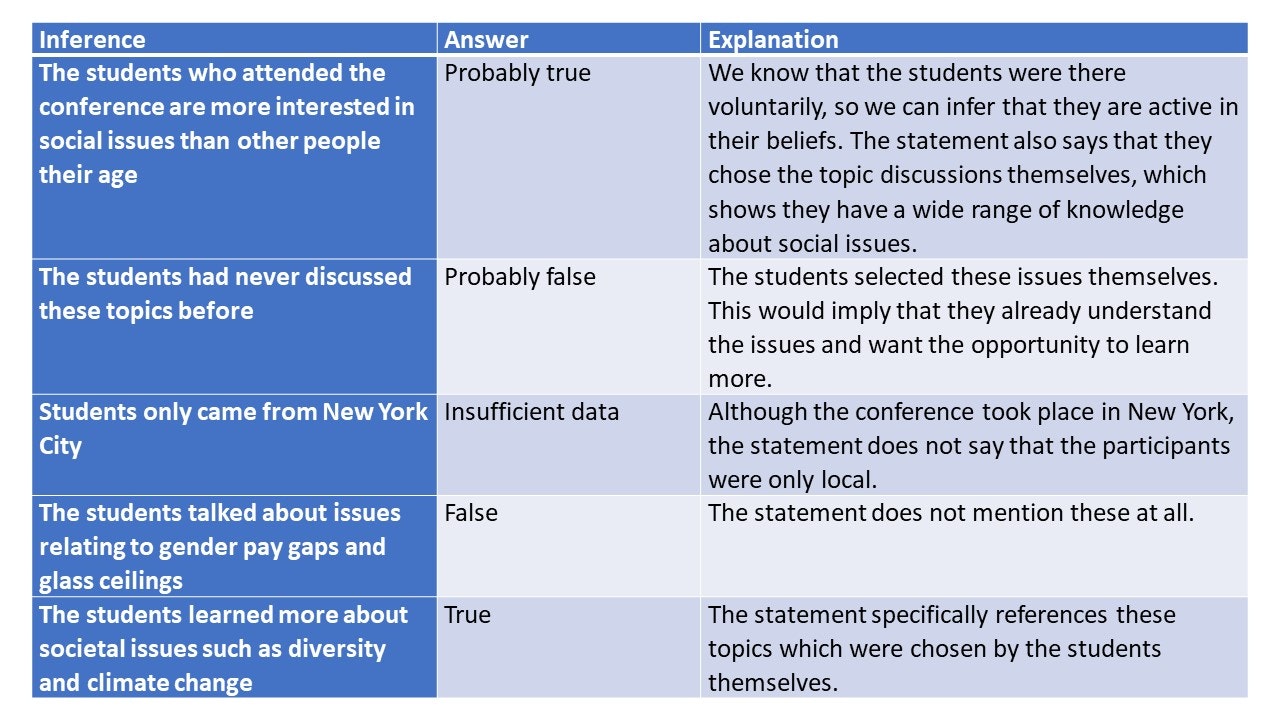
Assumptions
Many people make decisions based on assumptions. But you need to be able to identify when assumptions are being made.
Within the Watson Glaser test, you will be provided with a written statement as well as an assumption.
You will be asked to declare whether that assumption was made in the text provided or not.
This is an important part of the test; it allows employers to understand if you have any expectations about whether things are true or not. For roles in law or finance, this is a vital skill.
Example Statement:
We need to save money, so we’ll visit the local shops in the nearest town rather than the local supermarket
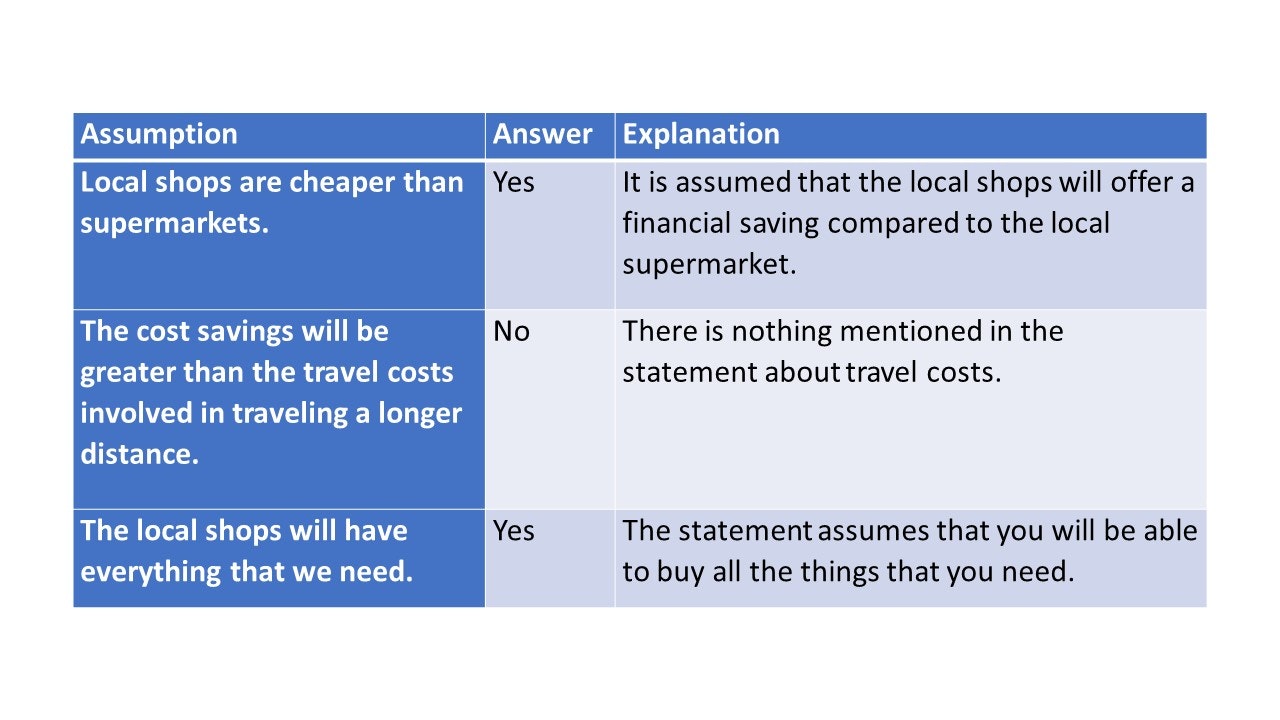
Deduction
As a core part of critical thinking, 'deduction' is the ability to use logic and reasoning to come to an informed decision.
You will be presented with several facts, along with a variety of conclusions. You will be tasked with confirming whether those conclusions can be made from the information provided in that statement.
The answers are commonly in a ‘Yes, it follows/No, it does not follow’ form.
Example Statement:
It is sometimes sunny on Wednesdays. All sunny days are fun. Therefore…
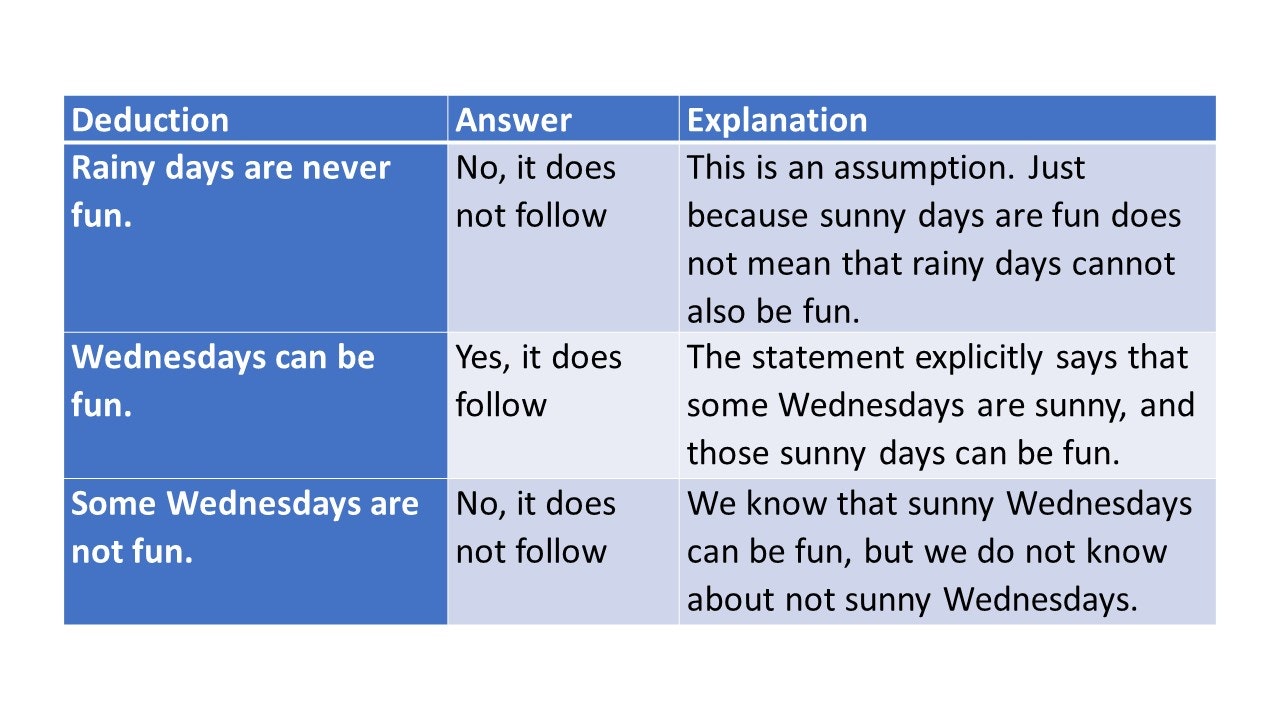
If you need to prepare for a number of different employment tests and want to outsmart the competition, choose a Premium Membership from TestHQ.
You will get access to three PrepPacks of your choice, from a database that covers all the major test providers and employers and tailored profession packs.
Interpretation
Critical thinking is also about interpreting the information correctly. It is about using the information provided to come to a valuable, informed decision.
Like the deduction questions, you will be provided with a written statement, which you must assume to be true.
You will also be provided with a suggested interpretation of that written statement. You must decide if that interpretation is correct based on the information provided, using a yes/no format.
Example Statement:
A study of toddlers shows that their speech can change significantly between the ages of 10 months and three years old. At 1 year old, a child may learn their first word whereas at three years old they may know 200 words
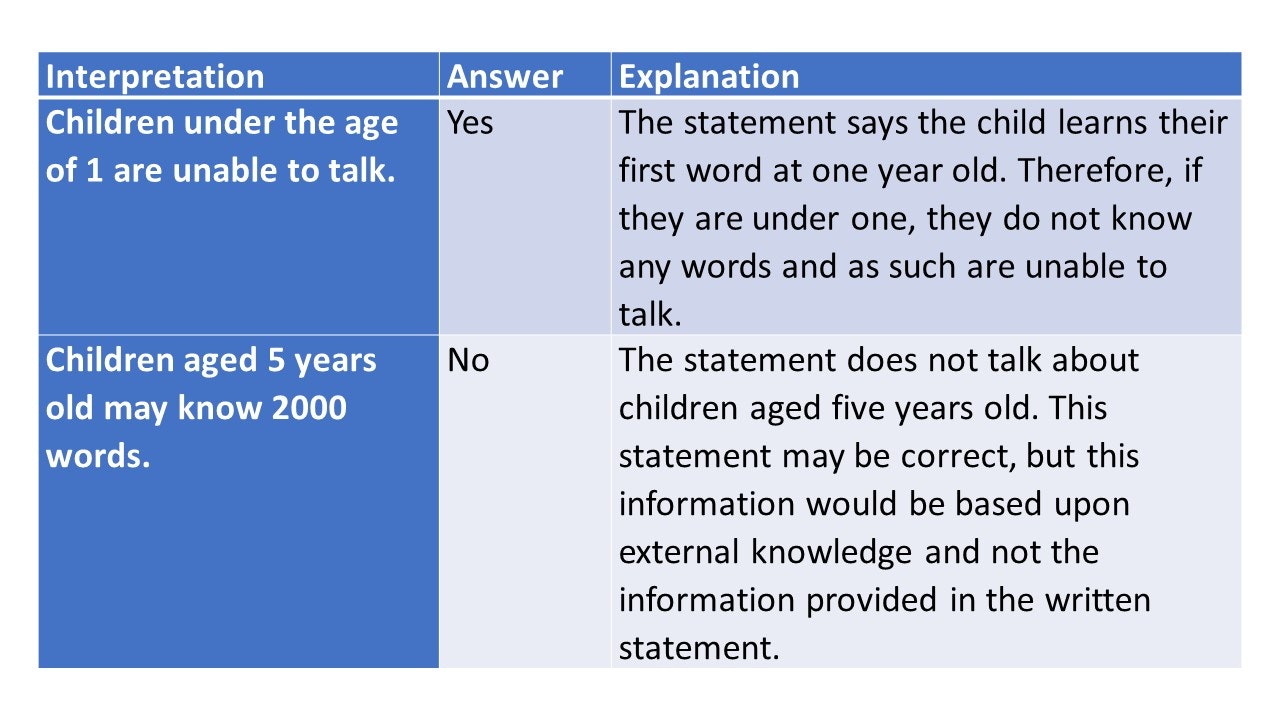
Evaluation of Arguments
This final part requires you to identify whether an argument is strong or weak. You will be presented with a written statement and several arguments that can be used for or against it. You need to identify which is the strongest argument and which is the weakest based on the information provided.
Example Statement:
Should all 18-year-olds go to college to study for a degree after they have graduated from high school?
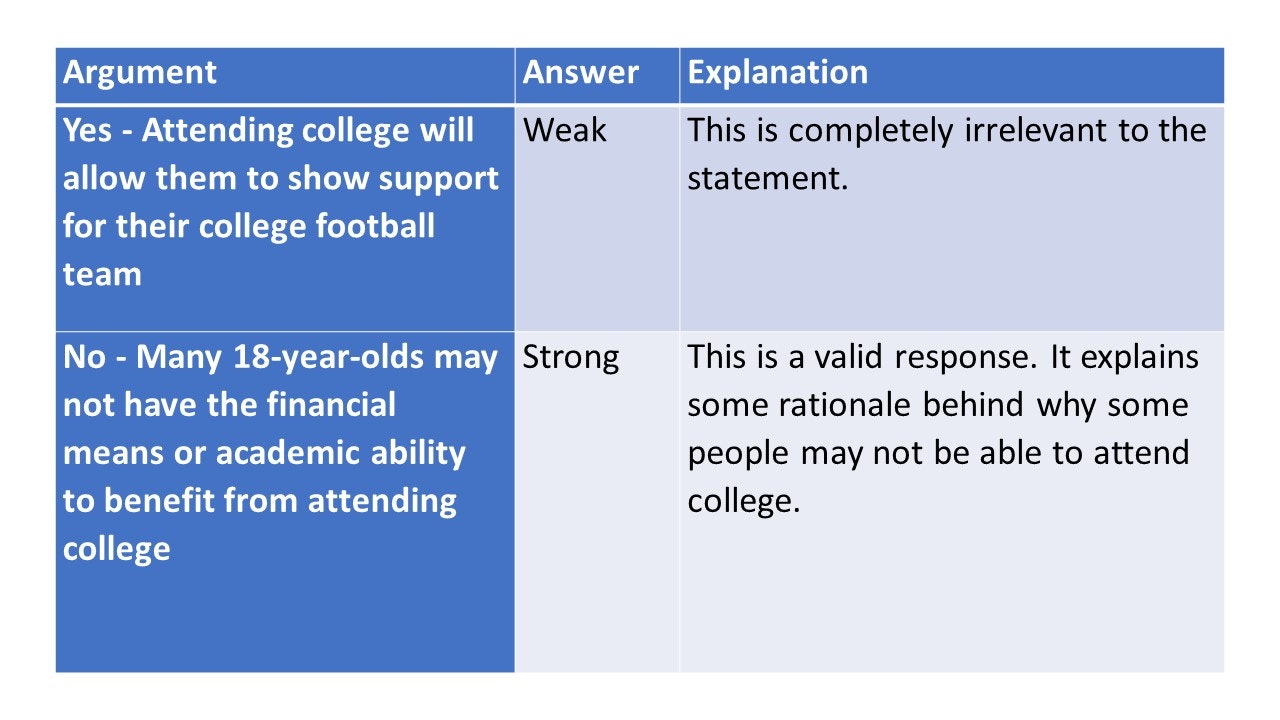
How to Pass a Watson Glaser Test in 2025
There are no confirmed pass/fail scores for Watson Glaser tests; different sectors have different interpretations of what is a good score.
Law firms, for example, will require a pass mark of at least 75–80% because the ability to think critically is an essential aspect of working as a lawyer.
As a comparative test, you need to consider what the comparative ‘norm’ is for your chosen profession. Your score will be compared to other candidates taking the test and you need to score better than them.
It is important to try and score as highly as you possibly can. Your Watson Glaser test score can set you apart from other candidates; you need to impress the recruiters as much as possible.
Your best chance of achieving a high score is to practice as much as possible in advance.
How to Prepare for a Watson Glaser Critical Appraisal in 2025
Everyone will have their own preferred study methods, and what works for one person may not necessarily work for another.
However, there are some basic techniques everyone can use, which will enhance your study preparation ahead of the test:
Step 1. Pay Attention to Online Practice Tests
There are numerous free online training aids available; these can be beneficial as a starting point to your preparation.
However, it should be noted that they are often not as detailed as the actual exam questions.
When researching for online test questions, make sure that any questions are specific to the Watson Glaser Test, not just critical thinking.
General critical thinking questions can help you improve your skills but will not familiarize you with this test. Therefore, make sure you practice any questions which follow the ‘rules’ and structure of a Watson Glaser Test.
Step 2. Paid-for Preparation Packs Can Be Effective
If you are looking for something that mimics the complexity of a Watson Glaser test, you may wish to look at investing in a preparation pack.
There are plenty of options available from sites such as TestHQ. These are often far more comprehensive than free practice tests.
They may also include specific drills (which take you through each of the five stages of the test) as well as study guides, practice tests and suggestions of how to improve your score.
Psychologically, if you have purchased a preparation pack, you may be more inclined to increase your pre-test practice/study when compared to using free tools, due to having invested money.
Step 3. Apply Critical Thinking to All Aspects of Your Daily Routine
The best way to improve your critical thinking score is to practice it every day.
It is not just about using your skills to pass an exam question; it is about being able to think critically in everyday scenarios.
Therefore, when you are reading the news or online articles, try to think whether you are being given facts or you are making deductions and assumptions from the information provided.
The more you practice your critical thinking in these scenarios, the more it will become second nature to you.
You could revert to the RED model: recognize the assumptions being made, by you and the author; evaluate the arguments and decide which, if any, are strong; and draw conclusions from the information provided and perhaps see if they differ from conclusions drawn using your external knowledge.
Prepare for Watson Glaser Test with TestHQ
Nine Top Tips for Ensuring Success in Your Watson Glaser Test
If you are getting ready to participate in a Watson Glaser test, you must be clear about what you are being asked to do.
Here are a few tips that can help you to improve your Watson Glaser test score.
1. Practice, Practice, Practice
Critical thinking is a skill that should become second nature to you. You should practice as much as possible, not just so that you can pass the test, but also to feel confident in using your skills in reality.
2. The Best Success Is Based on the Long-Term Study
To succeed in your Watson Glaser test, you need to spend time preparing.
Those who begin studying in the weeks and months beforehand will be far more successful than those who leave their study to the last minute.
3. Acquaint Yourself With the Test Format
The Watson Glaser test has a different type of question to other critical thinking tests.
Make sure that you are aware of what to expect from the test questions. The last thing you want is to be surprised on test day.
4. Read the Instructions Carefully
This is one of the simplest but most effective tips. Your critical thinking skills start with understanding what you are being asked to do. Take your time over the question.
Although you may only have 30 minutes to complete the test, it is still important that you do not rush through and submit the wrong answers. You do not get a higher score if you finish early, so use your time wisely.
5. Only Use the Information Provided in the Question
Remember, the purpose of the test is to see if you can come to a decision based on the provided written statement.
This means that you must ignore anything that you think you already know and focus only on the information given in the question.
6. Widen Your Non-Fictional Reading
Reading a variety of journals, newspapers and reports, and watching examples of debates and arguments will help you to improve your skills.
You will start to understand how the same basic facts can be presented in different ways and cause people to draw different conclusions.
From there, you can start to enhance your critical thinking skills to go beyond the perspective provided in any given situation.
7. Be Self-Aware
We all have our own biases and prejudices whether we know them or not. It is important to think about how your own opinions and life experiences may impact how you perceive and understand situations.
For example, someone who has grown up with a lot of money may have a different interpretation of what it is like to go without, compared to someone who has grown up in extreme poverty.
It is important to have this self-awareness as it is important for understanding other people; this is useful if you are working in sectors such as law.
8. Read the Explanations During Your Preparation
To make the most of practice tests, make sure you read the analysis explaining the answers, regardless of if you got the question right or wrong.
This is the crux of your study; it will explain the reasoning why a certain answer is correct, and this will help you understand how to choose the correct answers.
9. Practice Your Timings
You know that you will have five sections to complete in the test. You also know that you have 30 minutes to complete the test.
Therefore, make sure that your timings are in sync within your practice, so you can work your way through the test in its entirety.
Time yourself on how long each section takes you and put in extra work on your slowest.
Frequently Asked Questions
There is no standard benchmark score to pass the Watson Glaser test. Each business sector has its own perception of what constitutes a good score and every employer will set its own requirements.
It is wise to aim for a Watson Glaser test score of at least 75%. To score 75% or higher, you will need to correctly answer at least 30 of the 40 questions.
The employing organization will use your test results to compare your performance with other candidates within the selection pool. The higher you score in the Watson Glaser test, the better your chances of being hired.
It is not possible to fail a Watson Glaser test. However, your score may not be high enough to meet the benchmark set by the employing organization.
By aiming for a score of at least 75%, you stand a good chance of progressing to the next stage of the recruitment process.
Many candidates find the Watson Glaser test hard. The test is designed to assess five different aspects of logical reasoning skills. Candidates must work under pressure, which adds another dimension of difficulty.
By practicing your critical thinking skills, you can improve your chances of achieving a high score on the Watson Glaser test.
To prepare for Watson Glaser, you will need to practice your critical thinking abilities. This can be achieved through a range of activities; for example, reading a variety of newspapers, journals and other literature.
Try applying the RED model to your reading – recognize the assumptions being made (both by you and the writer), evaluate the arguments and decide which of these (if any) are strong.
You should also practice drawing conclusions from the information available to you.
Online Watson Glaser practice assessments are a useful way to prepare for Watson Glaser. These practice tests will give you an idea of what to expect on the day, although the questions are not usually as detailed as those in the actual test.
You might also consider using a paid-for Watson Glaser preparation pack, such as the one available from TestHQ. Preparation packs provide a comprehensive test guide, including practice tests and recommendations on how to improve your test score.
Candidates are allowed 30 minutes to complete the Watson Glaser test. The multiple-choice test questions are grouped into five distinct areas – assumptions, deduction, evaluation, inference and interpretation.
Companies all over the world use the Watson Glaser test as part of their recruitment campaigns.
It is a popular choice for professional service firms, including banking, law, and insurance. Firms using the Watson Glaser test include the Bank of England, Hiscox, Deloitte and Clifford Chance.
Most employers will only allow you to take the Watson Glaser test once per application. However, you may take the Watson Glaser test more than once throughout your career.
The next step after passing the Watson Glaser test will vary between employers. Some firms will ask you to attend a face-to-face interview after passing the Watson Glaser test, others will ask you to attend an assessment center. Speak to the hiring manager to find out the process for the firm you are applying for.
Conclusion
Start preparing in advance for the Watson Glaser test
The Watson Glaser test differs from other critical thinking tests. It has its own rules and formations, and the exam is incredibly competitive. If you are asked to participate in a Watson Glaser test it is because your prospective employer is looking for the ‘best of the best’. Your aim is not to simply pass the test; it is to achieve a higher score than anyone else taking that test.
Therefore, taking the time to prepare for the Watson Glaser test is vital for your chances of success. You need to be confident that you know what you are being asked to do, and that you can use your critical thinking skills to make informed decisions.
Your study is about more than helping you to pass a test; it is about providing you with the skills and capability to think critically about information in the ‘real world’.



